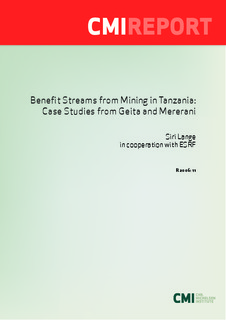Benefit Streams from Mining in Tanzania: Case Studies from Geita and Mererani
Research report
Permanent lenke
http://hdl.handle.net/11250/2435785Utgivelsesdato
2006Metadata
Vis full innførselSamlinger
- Bora-import [434]
Sammendrag
Tanzania is a ‘new’ mining country, and foreign investment in the mining sector has caused controversies. Government revenues from mining increased from2 million US$ in 1998 to 36 million in 2002, but many stake holders argue that foreign investors have been given too generous conditions. The great majority of direct taxes accrue to the national treasury, while local authorities have little or no tax income from mining. This report focuses on the CSR initiatives of two foreign mining companies: AngloGold Ashanti, operating Geita Gold Mine, the third largest gold mine in Sub-Saharan Africa, and Tanzanite One, operating in Mererani. The companies’ willingness to engage in benefit sharing, their methods for doing this, and their co-operation with local authorities varies greatly. Both mining communities have faced conflicts between small scale miners and foreign investors, but the conflicts have reached far higher levels in Mererani compared to Geita. The case studies show that at the local level, poor local governance has opened up for corruption in benefit streams management. Moreover, in Mererani, development projects sponsored by Tanzanite One have resulted in ethnic secessionism and affected local political processes. The two case studies focus on the triangular relationship between government (including local authorities), foreign owned mining companies, and local communities. What has guided benefit stream management up to now? What factors enhance or hinder an optimal management at the local level?
Utgiver
Chr. Michelsen InstituteSerie
Research reportR 2006: 11
